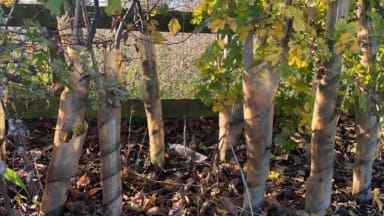
Originally used to encourage straight growth for the production of quality timber, plastic tree guards have been in use since 1979. Since they have been used as standard practice across the UK to provide protection from large populations of mammals such as deer, squirrels and voles.
Using plastic as a material for creating tree guards has allowed for cheap, effective, durable protection for trees over the decades. It is recommended that tree guards are removed from the trees after around 7 to 10 years as tree should then be strong and tall enough to no longer require protection. However, removal at this stage has often not occurred over last four decades, which the Forestry Commission acknowledges has led to a problem of plastic pollution in woodlands
Plastic pollution has been highlighted as a large-scale environmental issue and studies have shown a variety of problems that plastics of all types, shapes and sizes can cause in different environments and to different species. Knowing what they do now, the commission has undertaken the following:
- Established the Forest Plastics Working Group which focuses solely on plastics in the forestry sector to stay up to date with the latest research and knowledge, and be able to influence and help this movement go forward and grow.
- Established tree guard recycling hubs which support recycling opportunities across England for the sustainable disposal of tree guards. They directly supported a free Tubex recycling hub in Essex in 2023 which recycled more than 5,000 polypropylene tree guards – the equivalent of more than four hectares of woodland creation.
- Creation of the Plot That Plastic App – a citizen science app to map where plastic tree guards are in the environment across the UK. This will help to build a data set to plan their removal in the future and facilitate new recycling hub locations.
- Manage deer population – It is difficult to reduce the need for plastic tree protection whilst the pressures we need to protect the trees from are increasing year-on-year. The large boom in the population of deer over the decades has led to a significant negative impact on our woodlands and trees. We need to reduce the pressures that trees are facing to more sustainable levels to begin to extensively phase out the need for tree protection.
Establishing trees and woodlands is incredibly important, not only to reaching our target of 16.5% tree cover by 2050, but also doing something now to tackle climate change, the biodiversity crisis, and to bring about a greener and healthier country. Tree guards have played a vital role in this but should not be contributing to the wider environmental issue of plastic pollution. The Forestry Commission has stipulated that they will continue to work with their partners to find sustainable ways of planting trees whilst reducing the long-term plastic impact.

